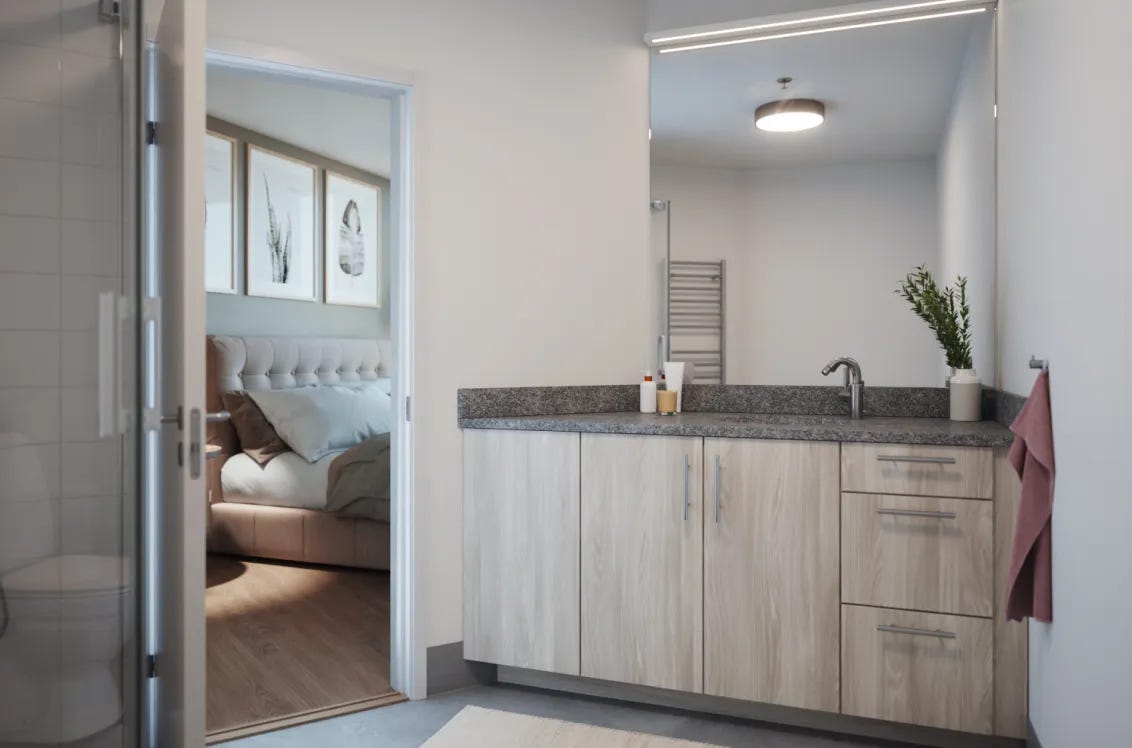Five Real Estate Tech Companies Doing Interesting Things | Q3 Edition
Each quarter, Thesis Driven profiles five innovative real estate companies doing interesting things
Thesis Driven dives deep into emerging themes and real estate operating models. This week’s letter features five real estate technology companies building compelling products.
As a real estate entrepreneur and writer, I regularly get asked about the real estate technology companies I find most compelling—particularly under-the-radar operators that haven’t yet been featured in The Information or taken the stage at CRETech.
As regular Thesis Driven readers know, I take some issue with ‘proptech’ as a category. But that’s not to say that there aren’t compelling companies building great products that meet real needs for real estate users. So I decided to make a regular feature of it: each quarter I’ll identify five real estate technology companies that have the potential to build a great business and make a meaningful impact on the category.
This is not just about the businesses as they stand today, as a number of those I’ll feature are small. Rather, a significant part of my analysis is the moat and quality of revenue that these companies have the potential to build as they grow. For each company, I’ll address a few things:
What the company does;
Why I like the category;
Why I like this company’s specific approach;
A bear case of why the company might fail.
And before anyone asks, I have no plans to start a Thesis Driven fund. Now on to the companies.
AUAR
https://automatedarchitecture.io/
TL;DR: AUAR uses mass timber materials and micro-factories to quickly and efficiently build new single-family homes.
Why I like the category: Despite the enticing market size—construction is a $1.8 trillion sector in the US alone—construction tech has generally proven disappointing with a number of high-profile venture-backed flameouts in recent years. Katerra was the big name in high-profile construction tech failures, but it was hardly the only one.
While construction tech is a notably Hard Problem, I have a feeling that construction innovation is simply in the Trough of Disillusionment rather than being a total dead end. The coming massive shortage of construction workers will also help usher in a new era by making the current system untenable by labor shortages alone.
Why I like AUAR’s approach: Of all the innovative approaches to construction, factories in close proximity to (or at) development sites appear to be the way to go as they avoid the tremendous transportation costs of off-site fabrication while also placating local trade unions and elected officials.
AUAR is founded by UCL architecture prof Mollie Claypool and has gotten its start tackling the single-family home market in Europe; they’re developing a neighborhood in Belgium this summer and claim to be able to deliver new-build homes 60% faster and 20% cheaper. Timber construction also helps AUAR homes avoid the ultra-modernist modular look that often plagues tech-forward construction companies.
The company is also pursuing a franchise model, licensing their technology to developers and charging a percentage fee on units produced in the factory as well as total project cost.
Bear case: Revolutionizing construction is hard, and the default outcome of construction tech companies is failure. Many things can go wrong in the construction process, and bringing technology into to the mix often ends up adding complexity and risk with little upside. Convincing developers to be early adopters of new construction tech is difficult, as they’re often taking on substantial technology risk with little proven cost savings (yet).
A heavy reliance on robotics and automation can also be challenging to get right in complex manufacturing processes, as the recent news of Black & Decker’s failures in Texas illustrate. AUAR and its peers may end up taking a more incremental approach to automation than they may hope.
(I’m also a fan of Cuby which is tackling a similar problem in the US with a distributed network of mobile factories including an on-site process solution. Construction is a massive sector, and it’s fair to believe that there will be multiple winners here… assuming anyone figures this out.)
Renew
https://heyrenew.com/
TL;DR: Renew helps owners and property managers of rental properties manage the lease renewal and retention process.
Why I like the category: While I’m generally not a fan of proptech point solutions, Renew is tackling a really important point: a tenant’s decision of whether or not to renew their lease. Turnover is a massive cost for owners in not just direct turn expenses (e.g., painting) but also the marketing spend, unit vacancy, and leasing agent time required to re-lease a churned unit. Having visibility into tenants’ renewal decisions also opens up a lot of interesting monetization opportunities which we’ll discuss below.
Why I like the approach: Renew is taking a thoughtful approach to the strategy and has brought some great multifamily owners and property managers on board as clients.
They also understand the long-term network effects of what they’re building: if they know when a resident is likely to move, they’re in a great position to help that renter find their next apartment. Participating owners could share referral bonuses between buildings, creating a meaningful moat and incentive for renters to stay in-network when moving. Today, Renew offers both intra-network (within an operator’s apartment network) and inter-network (between apartment operators) lead sharing programs.
Moving is also a major life event around which lots of other purchases happen. Upsells from furniture to personal loans would make sense for their audience, and revenue could be shared with multifamily owners to sweeten the pot.
Bear case: As with all point solutions, there is a real risk of being copied by a major incumbent—particularly the property management systems themselves—before a real moat can be built. It is difficult for a property manager to justify paying an additional fee to Renew if Yardi and RealPage are offering the same set of features out of the box. Renew must get big enough fast enough that the network effects of their renewal network exceed the cost to management companies. PMS companies’ poor track records building good consumer-facing software will work to Renew’s advantage.
PermitFlow
https://www.permitflow.com/
TL;DR: PermitFlow is a workflow and data management tool for construction permits serving developers and general contractors.
Why I like the category: Like renewals, construction permitting is a high-thrash point problem that isn’t well-addressed by existing tools in the market.
Given the amount of intelligence a permit management solution must collect on projects, PermitFlow is in a great position to offer a variety of upsells from construction finance to supply chain management. Forward-looking construction permit data is also very valuable to firms looking to better understand the real estate market, and PermitFlow is building a proprietary stream of data that front-runs public permit records.
Why I like the approach: PermitFlow is taking a focused approach to a sticky problem, prioritizing a nationwide permitting platform for a variety of users (developers, contractors, architects, etc.) rather than immediately tackling adjacent opportunities from day one.
Bear case: The construction permitting process varies from market to market, requiring some custom work for every market PermitFlow enters. This is a real cost, but it’s also a barrier to entry as PermitFlow scales and serves more markets. Of course, PermitFlow’s value proposition is also likely weaker in smaller markets where pulling construction permits is a simpler, ministerial process.
And as I mentioned earlier, there’s reason to be skeptical of any point solution product, as they can be copied by existing platforms with large customer bases and distribution channels.
Closing Theory Studios
https://closingtheory.com/
TL;DR: Closing Theory makes games based on actual real estate data.
Why I like the category: Over 70 million people browse Zillow every month, and many of them use it to pass the time and fantasize about real estate rather than an earnest attempt to buy a house.
Gaming is a massive category, with casual gaming in particular seeing the most growth and an audience that skews older and female—the same demographic spending hours per day browsing Zillow. Creating game-like experiences that use actual MLS data could take the mindless Zillow browsing to the next level.
Why I like the approach: Closing Theory had a successful prototype guess-the-price game called Zillwhoa earlier this year. (I believe I was near the top of the NYC price-guessing leaderboard for a time.) If their prototypes are any indication, they appear to be building simple, competitive games that build on consumers’ existing desire to look at real estate listings.
They raised $2.3 million in a round led by A16Z Games earlier this summer, so I’m not alone in liking their model.
Bear case: While there are plenty of ways to monetize casual games, Closing Theory will be most successful if they can demonstrate intent to buy and actually convert some percent of their gamers to real estate buyers. This may be easier said than done; compulsive Zillow browsing doesn’t always equate to buying.
StageGlass
https://www.stageglass.com/
TL;DR: StageGlass uses gaming technology (Unreal Engine) to make a better real estate visualization tool.
Why I like the category: Visualization is among the segments of real estate most likely to be upended by technology over the next 3-5 years. Automation, generative AI, web GPU, and other innovations will make it far easier for perspective real estate users—whether residential buyers, renters, or commercial occupants—to visualize highly detailed spaces that are yet to be built.
At Common, virtual tours either took the form of Matterport—the creation of which involved lugging a $5,000 camera on a tripod around a unit—or a live tour over Facetime or a similar platform. In not too long, visualization tools with surpass the capabilities of video for existing space as well.
Why I like the approach: Like Closing Theory, StageGlass is building a product at the intersection of real estate and games. But StageGlass is using game technology—specifically Epic’s powerful Unreal Engine—to transform construction documents into detailed, immersive 3D experiences.
Bear case: There are a number of companies providing real estate visualization tools using varying technologies and go-to-market approaches. It is not obvious that this space consolidates to one—or even several—winners, and new technologies are being introduced at a rapid-fire pace.
Disclosure: I’m on StageGlass’s board of directors and hold an equity stake in the business. As Doerr says: no conflict, no interest.
— Brad Hargreaves
Want more insights like this?
This is a free Thesis Driven letter, but most of our letters are for paying subscribers. We regularly dive deep into real estate topics like new real estate investment themes and concepts, OpCo-PropCo models and their backers, and the future of proptech.
Paid subscribers can also recommend topics for me to cover. Please consider becoming a paid Thesis Driven subscriber:







